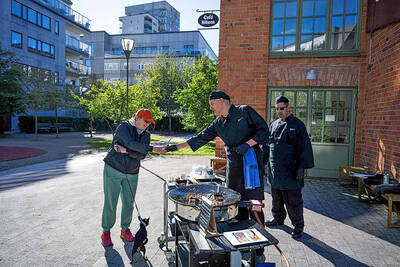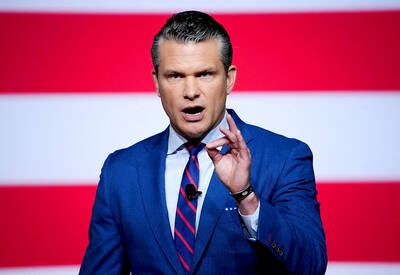After weeks of concentrating their attacks against US President Barack Obama on the economy, Republicans are branching out. They’re taking aim at his anti-terrorism policy.
“Just what is the administration’s overarching plan to take on the terrorist threat and to keep America safe?” asks House Republican leader John Boehner in a new Web video featuring ominous music, unsettling images and less than flattering photos of the president.
The production by the National Republican Congressional Committee is the latest part of a barrage in which former Vice President Dick Cheney, potential 2012 presidential contenders, Republican lawmakers and others seek to raise doubts about Obama’s early performance as commander in chief.
At times, the criticism is blunt, as when Cheney said Obama’s actions “raise the risk” of another terrorist attack like the one on Sept. 11, 2001.
At other moments, Republicans choose a less confrontational tone, posing uncomfortable questions.
Referring to the potential release of detainees now at the Guantanamo Bay detention facility, which Obama has pledged to close within a year, Senate Republican leader Mitch McConnell asked recently: “Will these trained terrorists be allowed to travel freely anywhere in the United States? What will their status be? Will they be allowed to stay here permanently?”
The robust new line of attack against the president coincides generally with the increased attention Obama has devoted to foreign policy issues in recent weeks.
At the same time, recent internal Republican polling suggests it is an area where Democrats are relatively weak, at least in contrast to domestic matters such as the economy, energy and education.
A poll by New Models, a firm with strong Republican ties, found that voters viewed Republicans and Democrats as equally competent in dealing with the war on terror, while Democrats are heavily favored on numerous domestic issues such as health care, energy and education.
In recent weeks, Republicans have seized on Obama’s handshake with Venezuelan President Hugo Chavez at an international meeting, his overtures to Cuba and his purported bow to Saudi King Abdullah while in Europe.
His decision to close the Guantanamo prison has now been joined by a decision to ban torture by US interrogators and the release of formerly classified memos detailing the administration of former US president George W. Bush legal justification for waterboarding.
At a news conference last week, Obama signaled that he understood the stakes. Responding to a question about his decision to release the memos, he said, “Ultimately I will be judged as commander in chief on how safe I’m keeping the American people.”
Other times, Obama has been dismissive of his critics.
He was still out of the country, in Trinidad, when Republican senator John Ensign said it was “irresponsible for the president to be seen kind of laughing and joking with Hugo Chavez,” the anti-US president of Venezuela.
Obama noted that Venezuela has a defense budget about one-six hundredth the size of the US’ and owns the oil company Citgo.
“It’s unlikely that as a consequence of me shaking hands or having a polite conversation with Mr. Chavez that we are endangering the strategic interests of the United States,” he said.

READINESS: According to a survey of 2,000 people, 86 percent of Swedes believe the country is worth defending in the event of a military attack Swedes are stocking up on food items in case of war, as more conflict in Europe no longer feels like a distant possibility, and authorities encourage measures to boost readiness. At a civil preparedness fair in southwest Stockholm, 71-year-old Sirkka Petrykowska said that she is taking the prospect of hostilities seriously and preparing as much as she can. “I have bought a camping stove. I have taken a course on preservation in an old-fashioned way, where you can preserve vegetables, meat and fruit that lasts for 30 years without a refrigerator,” Petrykowska said. “I’ve set aside blankets for warmth, I

FRUSTRATIONS: One in seven youths in China and Indonesia are unemployed, and many in the region are stuck in low-productivity jobs, the World Bank said Young people across Asia are struggling to find good jobs, with many stuck in low-productivity work that the World Bank said could strain social stability as frustrations fuel a global wave of youth-led protests. The bank highlighted a persistent gap between younger and more experienced workers across several Asian economies in a regional economic update released yesterday, noting that one in seven young people in China and Indonesia are unemployed. The share of people now vulnerable to falling into poverty is now larger than the middle class in most countries, it said. “The employment rate is generally high, but the young struggle to

ENERGY SHIFT: A report by Ember suggests it is possible for the world to wean off polluting sources of power, such as coal and gas, even as demand for electricity surges Worldwide solar and wind power generation has outpaced electricity demand this year, and for the first time on record, renewable energies combined generated more power than coal, a new analysis said. Global solar generation grew by a record 31 percent in the first half of the year, while wind generation grew 7.7 percent, according to the report by the energy think tank Ember, which was released after midnight yesterday. Solar and wind generation combined grew by more than 400 terawatt hours, which was more than the increase in overall global demand during the same period, it said. The findings suggest it is

‘ARMED CONFLICT’: At least 21 people have died in such US attacks, while experts say the summary killings are illegal even if they target confirmed narcotics traffickers US forces on Friday carried out a strike on an alleged drug-smuggling boat off the coast of Venezuela, killing four people, US Secretary of Defense Pete Hegseth said. The latest strike, which Hegseth announced in a post on X, brings the number of such US attacks to at least four, leaving at least 21 people dead. An accompanying video shared by Hegseth showed a boat speeding across the waves before being engulfed in smoke and flames. “Four male narco-terrorists aboard the vessel were killed,” the Pentagon chief wrote. He said the strike “was conducted in international waters just off the